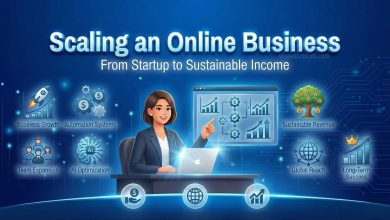Affiliate Marketing vs Online Store – What’s Better in 2025? : Comprehensive Guide
Affiliate Marketing vs Online Store : In the ever-evolving digital economy, two online business models continue to dominate in 2025: Affiliate Marketing and Online Stores (eCommerce). Both options offer immense earning potential, global reach, and flexibility for entrepreneurs. However, choosing between the two can be daunting—especially when you’re just starting out or aiming to diversify your income.
Table of Contents
This comprehensive guide explores the pros, cons, profitability, scalability, tools, startup costs, and future trends of affiliate marketing vs online stores in 2025, helping you make an informed decision based on your goals, skills, and resources.
Understanding Affiliate Marketing in 2025

Affiliate marketing is a commission-based business model where you promote another company’s product or service and earn a percentage of the sale when someone purchases through your unique affiliate link.
How It Works:
- You join an affiliate program (like Amazon, Flipkart, ShareASale, Impact).
- You receive a custom referral link.
- You promote the product via content—blogs, videos, email, or social media.
- When a user clicks your link and makes a purchase, you earn a commission.
Popular Affiliate Niches in 2025:
- Tech gadgets & electronics
- Finance & credit cards
- Health and fitness supplements
- Online courses and SaaS products
- Fashion and accessories
- AI tools and software
Understanding Online Stores (eCommerce) in 2025
An online store involves selling physical or digital products directly to consumers through a website or marketplace. You manage product selection, pricing, marketing, and customer service.
Also Read : Start a Fashion Store Online
Types of Online Stores:
- Dropshipping – Sell products without inventory. Suppliers ship on your behalf.
- Print on Demand (POD) – Sell custom designs on t-shirts, mugs, etc.
- Private Label – Source and brand your own products.
- Digital Goods – Sell eBooks, templates, software, music, or courses.
Popular Platforms for Online Stores:
- Shopify
- WooCommerce
- Wix eCommerce
- Amazon FBA
- Etsy (for handmade & vintage)
- Flipkart Seller Hub (India)
Startup Costs: Affiliate Marketing vs Online Store
| Business Model | Initial Investment (approx.) |
|---|---|
| Affiliate Marketing | ₹0 – ₹10,000 |
| Online Store | ₹20,000 – ₹1,00,000+ |
Affiliate Marketing Cost Breakdown:
- Domain & hosting (₹1,500/year)
- Content tools (Canva, Grammarly, etc.)
- Paid ads (optional)
- SEO tools (optional)
Online Store Cost Breakdown:
- Domain & hosting or eCommerce plan (₹5,000+)
- Product sourcing & inventory (if not dropshipping)
- Platform fees (Shopify, Amazon, etc.)
- Marketing & paid ads
- Logistics & customer service tools
Winner (for low cost): Affiliate Marketing
Earning Potential in 2025
Both models offer significant income potential, but in different ways.
Affiliate Marketing:
- Recurring commission from SaaS products
- Passive income if evergreen content ranks
- Limited control over product pricing or upselling
Online Store:
- Full control over pricing and profit margins
- Ability to create bundles and upsell
- Potential to build a brand and sell the business
Affiliate Example: Promoting a course with a 30% commission. You sell it for ₹10,000 and earn ₹3,000.
Store Example: Sell your own digital product for ₹10,000, keep 90% after payment fees.
Winner (for long-term profits): Online Store
Ease of Setup and Time Commitment
Affiliate Marketing:
- Easy to start
- No inventory or shipping
- Focus on content creation and traffic
- Takes time to rank on Google or build an audience
Online Store:
- Requires setup (product sourcing, shipping, design)
- Daily tasks: Order fulfillment, returns, queries
- Higher learning curve for beginners
Winner (for beginners): Affiliate Marketing
Scalability in 2025

Affiliate Marketing:
- Scales with traffic and SEO
- Limited control over product availability or commissions
- Difficult to scale team or create backend sales funnel
Online Store:
- Highly scalable with team, automation, and logistics partners
- Opportunity to build brand equity and customer list
- Can scale through paid ads, influencer marketing, or expansion
Winner (for scalability): Online Store
Branding and Ownership
Affiliate Marketing:
- You’re promoting another brand
- Limited customer data
- Less control over user experience
- Can’t build customer loyalty or email list (unless indirectly)
Online Store:
- Full control over branding, packaging, and experience
- You own the customer data (emails, phone numbers)
- Possibility to build a loyal community or fanbase
Winner (for brand building): Online Store
Risk and Responsibility
Affiliate Marketing Risks:
- Commission changes (Amazon has done this often)
- Link deactivation or expired cookies
- Account bans or advertiser discontinuation
Online Store Risks:
- Product returns or disputes
- Stock issues or supplier delays
- Handling logistics and customer support
- Higher financial exposure
Winner (for low risk): Affiliate Marketing
Tools and Platforms You’ll Need
Affiliate Marketing Tools (2025):
- Website builder: WordPress + Elementor
- SEO: Ahrefs, Ubersuggest, RankMath
- Email marketing: MailerLite, ConvertKit
- Link tracking: ThirstyAffiliates, Pretty Links
- Content AI: Jasper, ChatGPT
Online Store Tools (2025):
- Store builder: Shopify, WooCommerce
- Product design: Canva, Adobe Express
- Order fulfillment: Oberlo (dropshipping), Printful (POD)
- Payment gateway: Razorpay, Stripe, PayPal
- Analytics: Google Analytics, Hotjar
Time to Profitability
Affiliate Marketing:
- May take 3–6 months to see real income (especially organic traffic)
- Ads can accelerate results but reduce ROI
Online Store:
- May see sales within a week (with ads)
- Takes 3–12 months for profit consistency
- Higher marketing budget needed initially
Winner (for faster profits): Depends on strategy, but Online Store via ads may yield quicker returns
Trends to Watch in 2025
Affiliate Marketing Trends:
- Voice search affiliate SEO optimization
- AI-powered content marketing
- Higher conversions via YouTube affiliate reviews
- Affiliate influencers with micro-niche followers
- Recurring affiliate commissions from SaaS
Online Store Trends:
- AI-driven personalized ecommerce experiences
- Augmented Reality product previews
- WhatsApp and Chatbot Commerce
- UPI and instant payment checkouts in India
- Rise of headless commerce for speed & flexibility
Which Model is Best for You in 2025?
| Factor | Affiliate Marketing | Online Store |
|---|---|---|
| Startup Cost | Low | Medium to High |
| Profit Control | Limited | Full Control |
| Customer Ownership | No | Yes |
| Brand Building | Low | High |
| Time to Maintain | Low to Medium | Medium to High |
| Passive Income | High Potential | Lower Unless Selling Digital |
| Risk | Low | Moderate to High |
| Long-Term Asset Value | Low | High (you can sell your store) |
Best of Both Worlds: Hybrid Strategy
Why choose one when you can combine both?
How?
- Build an authority niche blog with affiliate links.
- Launch a digital product or eBook on your site.
- Build a list using a free lead magnet.
- Later, launch your own online store with your products.
- Use affiliate revenue to fund your store ads.
Example: A fitness blogger promotes supplements (affiliate) while selling personalized meal plans (own digital store).
This hybrid approach gives you passive income + brand control + multiple revenue streams.
Affiliate Marketing vs Online Store – Conclusion :

Both affiliate marketing and online stores are powerful, scalable, and profitable in 2025. Your choice should depend on your:
- Risk appetite
- Budget
- Time availability
- Technical skills
- Long-term goals
Choose Affiliate Marketing if:
- You want low-cost entry
- You’re great at content creation and SEO
- You prefer a passive or semi-passive model
- You don’t want to handle logistics or customer service
Choose an Online Store if:
- You want full control and brand ownership
- You’re ready to invest more upfront
- You want to scale and eventually sell your business
- You’re comfortable managing customer support and supply chains
For many entrepreneurs in 2025, starting with affiliate marketing is a smart way to learn online business fundamentals—then graduating into your own branded online store when you’re ready.
Buy Now : Ecommerce Website With 100 Products
Disclaimer : This article is intended for educational purposes only. Earnings and business outcomes may vary depending on your effort, market conditions, and strategy. Always consult with a professional before making major business or financial decisions.
Keywords : Affiliate Marketing vs Online Store – Affiliate Marketing vs Online Store 2025 – Affiliate Marketing vs Online Store Guide.



